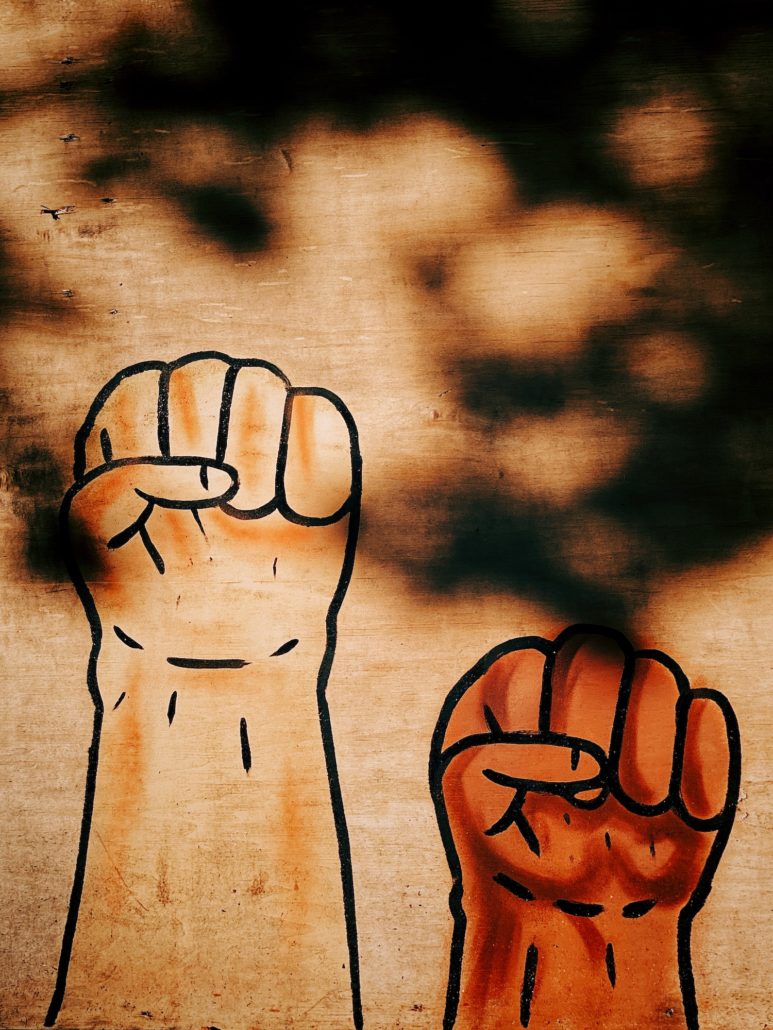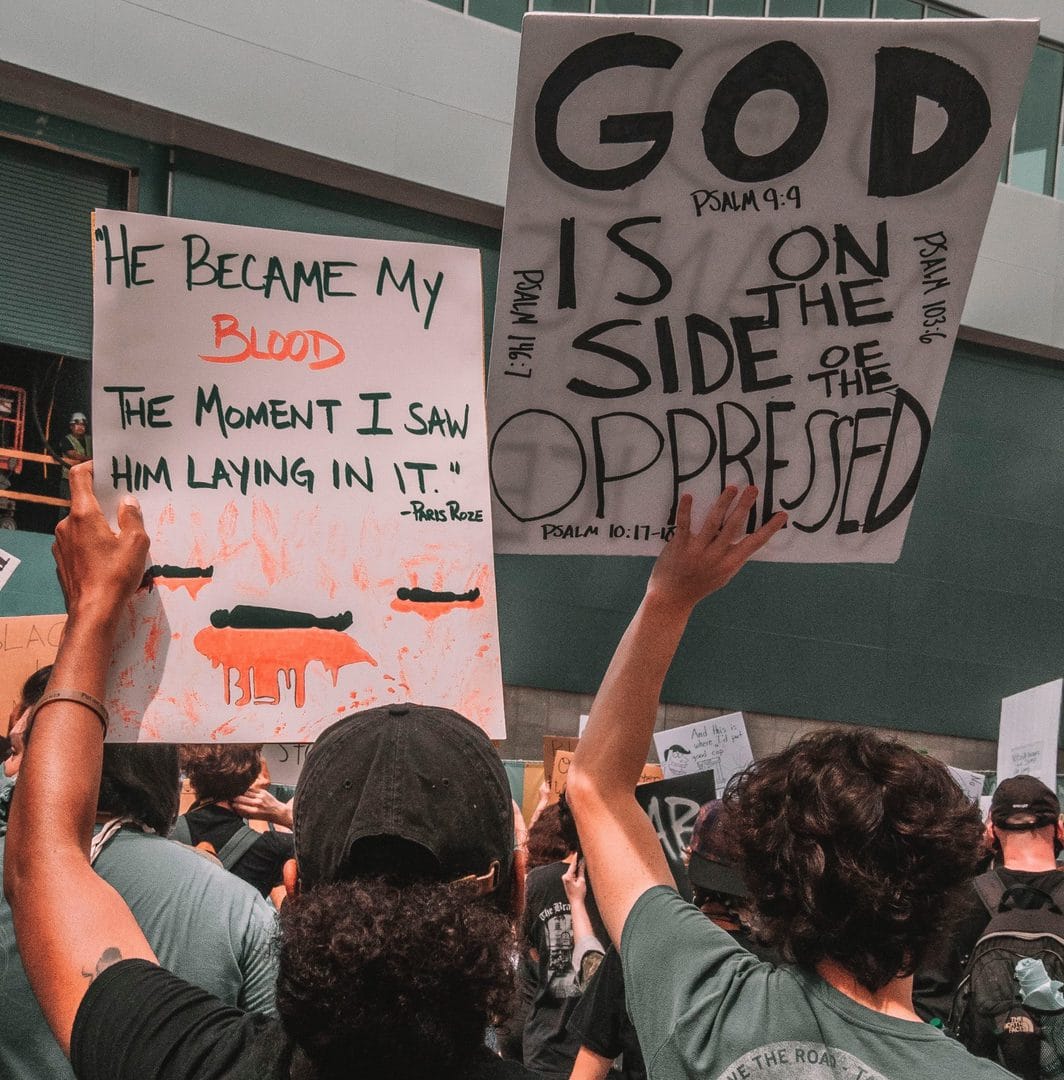Now is the time for a robust theology of resistance and persistence.
As the violence that has always surrounded us swirls and stings our eyes, intensified by the uncertainty of this volatile time, I, like many, find sanctuary in my faith. But we need more than spiritual refuge. We need guidance in the desert as harsh winds of distrust and fear erode shelters of compassion and kindness. As the fragile foundations of our imperfect democracy crack under the strain of rivalry and inequality, we need to find our footing on a stronger path that won’t crumble beneath us.
In these turbulent times, it helps to ground ourselves in eternal promises of hope: the poor are blessed, mourners will be comforted, this world belongs to the meek, and those who hunger and thirst for justice will be filled.
Jesus’s lessons in the Beatitudes and throughout the Sermon on the Mount seem so far removed from our national ethos. We still have such a long way to go to acknowledge and repent of the deep, systemic racism and violence at the core of our cultural consciousness, which manifest themselves in infinite ways. In spite of all our divisions, our nation has long touted its “exceptionalism.” Yet now we are in the midst of a deadly pandemic and a volatile electoral season, and all our investment in violence has boomeranged upon us and left us vulnerable. Anger and fear pervade our atmosphere.
In these turbulent times, it helps to ground ourselves in eternal promises of hope.
Can the Sermon on the Mount really be the source of hope we need when it seems so far from where we are? What do we make of a sermon that declares the poor blessed and commands us to love our enemies in a land where profit equals power and enemies are crushed?
In fact, the Sermon on the Mount is a call to resistance to the status quo of violence and persistence in hope. Because of its core ethic of nonviolence and its insistence on the blessing of the powerless, it can be misinterpreted as a dissuasion from action, a plea to settle down and accept authority. Yet it uproots and overturns a conventional order built on and maintained by violence and builds a new order of Love in its place.
The first step of this transformation is resistance, and the first step of resistance is repentance. Before the powers of exclusion, greed, and coercion sweep us along in their destructive path, we are called to repent – turn around – and resist the tide that threatens to drown us all.

The Sermon on the Mount catches us in the current of our cultural violence and turns us around first by drawing our attention to the victims swept under the wave of human violence. Those trampled by the empire are not meant to be seen or considered, much less blessed. Acknowledging the victims of empire is the first step to transforming empire into God’s Beloved Community.
How are the poor in spirit, the mourners, the meek, those who hunger and thirst for justice, blessed? Jesus blessed the people on the margins of his culture by embracing them, showing solidarity with them, building a community in which those who had always been shunned were welcomed and loved. As the body of Christ, we are called to be that blessing. This means standing with black and indigenous people whose lives have been devalued since before the founding of our nation, standing with immigrants and refugees who seek opportunity or simply survival in our nation, and also standing in international solidarity with those who mourn loved ones in the wake of our government’s drone attacks. Suffering far outlasts any administration, and our commitment to the needs of those suffering must transcend partisanship.
One problem with connecting advocacy to partisan political outrage is that often the needs of the people get lost in the desire to “win.” Jesus’s vision of healing a world in pain begins with blessing, not blame, so that we may keep our focus on those in need of comfort. Where rivalry crushes victims, compassion recognizes them and enters into their pain.
Once we are re-oriented – turned around – toward those on the underside of empire, Jesus warns us against falling back into the current. We’re called to continual, dedicated persistence, holding fast to hope and lighting the way for others. Do not get swept away into the undifferentiated stream of violence, like salt that has lost its flavor, Jesus councils. The fog of violence obscures and obliterates all moral distinctions as fighters on either side forget what they are fighting for in their quest to annihilate the enemy.
The Olive
Branch
Take A Breath with Us
Our weekly newsletter creates a space to take a breath. Once we slow down, we can see the way desire, imitation, and conflict operate in our lives and in the world, and begin to create peace. In addition to the newsletter, you will receive the free "Unlearn the Bible" ebook when you subscribe.
When our vision is oriented toward an enemy and we see through the lens of anger, we are susceptible to the ever-escalating cycle of violence that leads to murder and vengeance. Turning our vision from enemy to friend-in-need, from enmity to empathy, Jesus commands us to shine a light and model this way of compassion, living into our destinies as image-bearers of God, image-bearers of Love.
This is not to say that Jesus leaves us with nothing to say to those who wield powers of oppression and violence. Acknowledging the victims of oppression, meeting them at the margins and building community upon their inclusion and well-being is the first step toward subverting and transforming oppressive systems. But Jesus has specific instructions for our encounters with those who wield the powers of coercion and domination:
Do not resist an evildoer. But if anyone strikes you on the right cheek, turn the other also; and if anyone wants to sue you and take your coat, give your cloak as well; and if anyone forces you to go one mile, go also the second mile. (Matt. 5:38 – 41)
Peace and justice theologian Walter Wink has famously exegeted this passage to explain that what has been translated as “do not resist” is more accurately “do not resist violently,” and has shown that turning the other cheek is a form of resistance. It is hard to strike the right cheek with the right hand unless you are giving someone a back-handed slap, a gesture of superiority. Turning the other cheek rejects the power-dynamic that suggests that the one who was slapped is inferior and asserts equality. The same principal is at work in the other examples Jesus uses. Neither acquiesce to evil nor return evil for evil, Jesus instructs, but reject oppression by asserting your own dignity with firm compassion, refusing to participate in or perpetuate the cycle of violence. In doing so, you refuse to be either a helpless victim or a heartless monster. You reaffirm your own humanity and acknowledge that of the one who would dehumanize you.

When Jesus finally comes around to the injunction to love our enemies, that is the natural culmination of teachings that refocus us from enmity to compassion. He teaches us never to lose sight of the human face in front of us. First we must see the humanity in those trampled by systems of power. Then we must see the humanity in those who wield those systems. Forces of exclusion, greed, and violence transcend even those who seem to control them, gripping humanity in their thrall. Striving to overturn oppressors through violence leaves systems of oppression intact. But Jesus teaches us to overturn violent systems with active compassion which begets understanding, reconciliation, and love.
Though the way forward is yet unclear, we are called to follow in the footsteps of Jesus, seeing our nation and everyone in it – all who bear the scars of violence, anger, and distrust – through eyes washed with tears of compassion. May we robustly struggle against forces and policies that deny the full dignity of our brothers and sisters – all people everywhere – while remembering the humanity of those who wield such policies. May we seek not to exert the powers of exclusion and violence for ourselves, but to transform them into powers of inclusion. And may our repentance from our own violence – our reorientation from anger at enemies to compassion for those on the underside of violent power – be a source of hope in a time of trouble. Amen.
